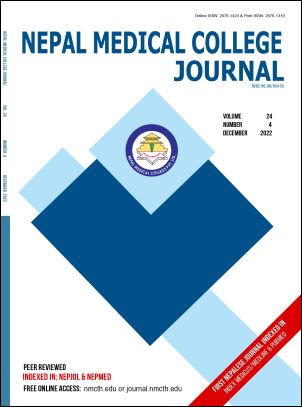Cystatin C as an Early Marker of Cardiorenal Syndrome Type 1 in Patients Admitted with Acute Heart Failure
DOI:
https://doi.org/10.3126/nmcj.v24i4.50586Keywords:
Acute heart failure, cardiorenal syndrome, cystatin CAbstract
The development of acute renal dysfunction in patients with acute heart failure is known as cardiorenal syndrome (CRS) type 1. Cystatin C has emerged as an alternative to serum creatinine which helps to detect early deterioration of the renal function, and in turn help to initiate necessary interventions in management to prevent acute kidney injury (AKI). This is a prospective observational study which was conducted in the Department of Cardiology, Bangabandhu Sheikh Mujib Medical University, Dhaka, Bangladesh. The blood sample of the patients was collected on the day of admission for serum cystatin C and serum creatinine, then serum creatinine was subsequently followed on days 2 and 7, to identify the development of cardiorenal syndrome type 1. Cardiorenal syndrome type 1 developed in 18 (35.3%) of 51 patients admitted to the CCU. Most of the patients were men and had a median age of 57.61±12.99 years. Patients who had developed AKI had a higher serum cystatin C level (1.58±0.191mg/L vs. 0.971±0.344 mg/L) and also revealed that the stage of severity of the KDIGO AKI was correlated with a higher serum cystatin C. Serum cystatin C was proven as a good early biomarker for the diagnosis of cardiorenal syndrome type 1.
Downloads
Downloads
Published
How to Cite
Issue
Section
License
Copyright (c) 2022 Nepal Medical College Journal

This work is licensed under a Creative Commons Attribution 4.0 International License.
This license enables reusers to distribute, remix, adapt, and build upon the material in any medium or format, so long as attribution is given to the creator. The license allows for commercial use.




